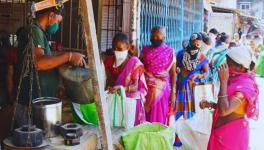COVID-19 in Rural India–II: ‘I Had to Sell Cocoon @Rs 150/kg,Instead of Rs 500/kg’
Representational Image.
This is the first report in a series that provides glimpses into the impact of COVID-19-related policies on life in rural India. The series, commissioned by the Society for Social and Economic Research, comprises reports by various scholars who have been conducting village studies in different parts of India. The reports have been prepared on the basis of telephonic interviews with key informants in their study villages. This article focuses on the disruption of economic activity on the villages of Alabujanahalli and Siresandara in Karnataka as a result of the lockdown declared on March 24, based on telephonic interviews conducted on March 31 and April 1.
Alabujanahalli is located in Mandya district of Karnataka and the major crops grown here are rice, sugarcane, finger millet, and sorghum. The kharif crop (June to October) of rice requires intensive irrigation, and large-scale farmers hire workers to undertake the transplantation and harvesting of rice in this period. Pre-kharif rice cultivation is usually done by small farmers with fewer irrigation facilities between February and May. This phase in the village is a lean period with very few employment opportunities for agricultural wage workers.
Siresandara is in Kolar district. Here, farmers cultivate vegetables and finger millet between October and February. Vegetable cultivation is undertaken by large cultivators, while finger millet is grown by everyone in the village for home consumption.
In addition to agriculture, dairying and sericulture are important economic activities in both the villages and are primarily dependent on labour by women.In sericulture, the task of feeding leaves to worms and plucking cocoons from sericulture mountages are mostly carried out by women. Women are also responsible for most of the work related to livestock, including cleaning animal sheds, milking and depositing milk.
Since the lockdown on March 24, farmers in Siresandara have been affected by disruption in transport services and in market procurement. Perishable horticultural crops cannot be stored and there are no advanced post-harvest storage facilities in the village. This has led to the loss of a large quantity of cauliflowers, tomatoes, ridge gourds, and broad beans because of the farmers’ inability to take them to the market.
The harvesting of these crops had begun in the last week of February, and continued until the first week of March, after which farmers found it difficult to sell their produce.
Availability of labour is not a major constraint in Siresandara, as most are hired from within the village. "We are getting workers to harvest, but how will we pay them, if we cannot sell our produce?" asked respondent RC, who is a large-scale peasant in the village, and had cultivated tomatoes, ridge gourds, and broad beans on around eight acres of land.
Another respondent, SU, echoed similar worries, as he had to abandon two acres of his cauliflower crop because of inability to take the produce to the market. SU saideven if he had found a way to transport the produce to the first-stage market in Kolar town, he would not have been able to sell it because the prices had plunged, causing panic among large and medium farmers.
Both these respondents were unaware of the recent advisory from the Home Ministry exempting agricultural activities from the shutdown. The situation appeared grim because the demand for the vegetables from neighbouring cities fell with the closure of canteens and restaurants. Transporting produce to markets in neighbouring states has also not been possible because of the lockdown.
In Alabujanahalli, sugarcane harvesting and transplantation of pre-kharif rice crop were underway when the lockdown was declared. Since the latter is done by local women workers, the work was completed without interruption.
However, sugarcane cultivators had to face problems, as they enter into labour contracts with the factory to mitigate labour shortage, and the sugar factory in Mandya district sends migrant workers from Bellary on piece-rated contracts to harvest sugarcane. Around 60% of these migrant workers were sent back after being paid for the number of days they had worked.
The remaining 40%of the labour was accommodated in shelters in the village and the cultivators arranged for cooked food to be provided to them. The factory has been allowed to continue procuring produce until April 4, 2020, but it is unclear whether the sugarcane cultivators will be paid before the closure of the factory. There is also no clarity on what arrangements, if any, will be made for the remaining migrant workers.
Sericulture is also a significant part of the incomes and livelihoods of people in both these villages, and Karnataka is home to Asia’s second largest cocoon market (Ramanagara).
"I had 300 kilograms of cocoons to be sold at the market, but with the lockdown, the markets for cocoons are suspended. I have offered to sell the cocoons at a lower price to households within the village, but everyone is afraid to start a new cycle given the situation", said respondent SU from Siresandara.
A respondent from Alabujanahalli voiced similar concerns. "I could not sell my produce as the market is temporarily shut. I have sold some produce in an informal channel at Rs 150 per kg of the cocoon, the price of which otherwise would be Rs 500 per kg".
The procurement of cocoons has ceased as exports have been temporarily suspended, which has adversely impacted those engaged in sericulture. The Karnataka state government had said it would announce specific measures to mitigate the crisis.
Dairying has also been negatively impacted. A factory worker at KOMUL (Kolar-Chikkaballapura Cooperative Milk Producers' Union Limited) dairy said the milk factory was open only for pasteurising milk and preparation of curd. Other activities, such as the preparation of sweets, have ceased since the lockdown was announced. The factory is currently running with less than 50% of the workforce; most of whom hail from nearby villages and have been paid for the month. There has been a decline in milk sales over the past couple of days because of the closure of street tea shops, restaurants and office canteens in nearby towns.
Although livestock owners in Siresandara continued to deposit milk at the procurement centre, there is fear that procurement might be suspended if there is a further decline in milk demand. Alabujanahalli is facing similar issues. As a respondent put it, "Money from dairying is a source of regular cash flow. Fortnightly payment by the dairy centre helps us sustain certain needs through the month. The dairy has informed that procurement would stop in two days as demand has fallen. If that happens, we will suffer a major setback."
The disruption in milk sales will particularly hurt small and medium peasants for whom dairying constitutes a significant share of income. Peasants have been using their already purchased stock of feed and fodder for their animals, but they are unsure of how they will replenish these. Poultry farmers have also suffered income losses from the abrupt decline in demand because of rumours that COVID-19 spreads from consumption of poultry and meat.
Landless Workers Worst Hit
Landless manual workers are among the worst affected by the lockdown. While peasants have some stocks of finger millet, landless workers have none, and the loss of employment they have faced in the past two weeks could seriously compromise their food security (a few had sown finger millet on small patches of land in November and December last year; this crop was harvested in February).
Women wage workers who are employed in the harvesting of crops and sericulture within the village felt that the demand for work had come down even though they are willing to participate in field operations. A few who participated in the harvesting of the standing crops of vegetables were paid in kind instead of cash.
"We are getting potato, ridge gourd and tomatoes in wages for our work that is going to feed us for next 10 days after which we are not sure about the availability of food in the village. We do not have any money with us," said YA, a 48-year-old woman who is a daily wage worker in Siresandara. Her husband VT, who is a tractor driver, added that he had been unemployed for the past 15 days. When asked about the free rations they are entitled to, they said that four kg of rice and one kg of arhar dal (pigeon pea) were distributed in the village on March 31, 2020. They were not aware of the quantity of rations that had been promised. Manual worker households had Jan Dhan accounts, but so far no money has been deposited in these.
The hardships of the lean season have been aggravated by the closure of non-farm services in adjacent towns. Wage workers in Alabujanahalli often find employment on construction sites. Some also contracted themselves out to sell coconuts on the Mysuru-Bengaluru highway. None of these opportunities has been accessible on account of the lockdown.
"Generally in this season, there are no agricultural operations. Rice transplanting got over in February. Until June, there would not be much work for us in the village. The men from the family go to towns to find some work in construction sites that also would not be workable in this situation. We have some grains to cook and eat, but the situation is extremely distressing" said one wage worker from Alabujanahalli.
Employment opportunities for hired workers have also fallen because, given their inability to pay hired workers. Peasants are relying on family labour, with women from peasant households harvesting vegetables themselves.
Little MGNREGA Work
In both the villages, there has been little work available under the MGNREGS (Mahatma Gandhi National Rural Employment Guarantee Scheme). A small number of workers did get work last year, but days of work numbered fewer than 30. Their dues were cleared between March 28 and March 31, 2020.
The woes of the service industry have affected the livelihoods of a few in the village. Some young men in the village, who have worked as cab drivers, street vendors and plumbers, have not been paid what they were owed by aggregators/contractors. Most of them are unemployed and confined to their homes.
Some respondents were aware of some of the announcements made by the state government on television; however, they were not confident about the implementation of the schemes announced. There were no mechanisms to ensure the immediate reach of free food grains to the beneficiaries. None of the households reported any information on the continuation of mid-day meals or the provision of grains instead of cooked meals.
Large farmers were aware of crop loan schemes, but were not informed about the implications of the current crisis on conditions of repayment and whether there would be any waiver or interest subvention. Pensions and other payments that have been assured were not yet credited to the accounts.
Women members of Self-Help Groups (SHGs) were aware of the possibility of deferring payments for three months. They were in the process of assessing their options for getting non-collateral loans as announced by the central government.
In terms of general awareness on COVID-19, households seemed toaware of the spread of the infection. The markets had strict rules in place, including timings for each village and social distancing protocols. The respondents felt that the impact of the disease was being felt more in cities, as they believed rural areas were insulated from infection.
There have been no instances of wage workers returning to these villages from other places. There is a functional ATM at a distance of 2-4 kilometres from both villages, but none of the villagers had stepped out to get money. ASHA (Accredited Social Health Activist) workers in both villages have educated people on the need to regularly wash hands and maintain distance.
The crisis caused by the lockdown has had a differentiated impact on the villages’ inhabitants. Peasant households in the villages have access to harvested finger-millet and rice but are hit by the disruptions to horticultural crop procurement and milk procurement. Small farmers who depend on money from dairying at regular intervals are uncertain whether this will continue to come in; farmers are facing disruptions in market procurement and fluctuations in prices owing to the reduced demand for vegetables and milk (in contrast, concerns about the availability of these supplies have been on the rise in cities like Bengaluru and Mysuru—it is a unique situation wherein rural households are confronting a condition of reduced demand and urban families are anxious about a possible supply crunch).
The situation could get worse for manual workers if cash transfers and other social protection measures do not reach them quickly. Food security is a concern for this class of households as they have had to confront seasonal unemployment and a lack of income-earning options. Some respondents hoped that community assistance in a village would be better than in the cities and that more affluent farmers wouldhelp them with grain and vegetables. They look for support from the state in the form of food supplies and employment opportunities (MGNREGS work).
The writers are Research Scholars, Economic Analysis Unit, Indian Statistical Institute, Bangalore.
Get the latest reports & analysis with people's perspective on Protests, movements & deep analytical videos, discussions of the current affairs in your Telegram app. Subscribe to NewsClick's Telegram channel & get Real-Time updates on stories, as they get published on our website.
























